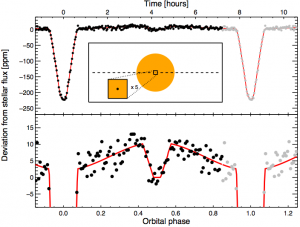
Figure 3 from Sanchis-Ojeda+ (2013) showing observations of the Kepler-78 b’s shadow as it passes in front of its host star.
I sat in on University of Maryland Astronomy’s colloquium, today given by Roberto Sanchis-Ojeda of the Kavli Institute at MIT. He discussed his recent paper announcing the discovery of Kepler-78 b, an Earth-sized planet with on orbital period of only 8.5-hours. In such a short orbital period, this planet is only 0.01 AU distant from its host star, almost 100 times closer to its star than the Earth and 40 times closer than Mercury are to our Sun.
Unfortunately, since the planet is so small, we don’t have a direct estimate of its mass, but so close to its sun, the planet’s day side is baking at a temperature probably greater than 1,500 K (2,200 degrees F), above the melting point of rock — The planet’s day side is probably covered by a lake of molten rock.
Kepler-78 b is one of a few very hot rocky planets discovered so far and the shortest-period transiting planet confirmed. CoRoT-7 b was the first one (discovered by the CoRoT mission), and Kepler-10 b was the first rocky planet discovered by the Kepler mission. The origins of these very hot rocky planets are unclear — they probably didn’t FORM so close to their host stars (although some have suggested rocky planets MAY form very close to their host stars). In any case, they represent yet another entirely unexpected but exquisitely interesting discovery in extrasolar astronomy.